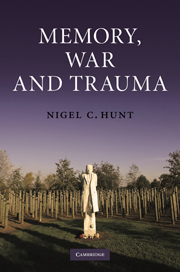Book contents
- Frontmatter
- Contents
- Preface
- 1 Background and purpose
- 2 Historical perspective
- 3 Methods and ethics
- 4 Current theory: post-traumatic stress disorder
- 5 Approaches to understanding trauma
- 6 Positive outcomes of traumatic experiences
- 7 Memory and history
- 8 Personal narrative and social discourse
- 9 Illustrating narrative as a scientific technique: the role of social support
- 10 Ageing, trauma and memory
- 11 Literature and trauma
- 12 Memorialisation and commemoration
- 13 Battlefield tours
- 14 Conclusions and future directions
- References
- Index
8 - Personal narrative and social discourse
Published online by Cambridge University Press: 05 June 2012
- Frontmatter
- Contents
- Preface
- 1 Background and purpose
- 2 Historical perspective
- 3 Methods and ethics
- 4 Current theory: post-traumatic stress disorder
- 5 Approaches to understanding trauma
- 6 Positive outcomes of traumatic experiences
- 7 Memory and history
- 8 Personal narrative and social discourse
- 9 Illustrating narrative as a scientific technique: the role of social support
- 10 Ageing, trauma and memory
- 11 Literature and trauma
- 12 Memorialisation and commemoration
- 13 Battlefield tours
- 14 Conclusions and future directions
- References
- Index
Summary
The previous chapter demonstrated the role and importance of the past in enabling individual understanding. This chapter moves to the present to show how the social world plays a crucial role in determining how we think about ourselves and the world. In order to develop a complete theory of the response to traumatic events, it is critical to consider the response, not only from the psychological perspective, but also the broader social world. War trauma is not an individual disorder. It arises out of a complex interaction of personal, social, cultural, historical and political forces – the relationship between the personal narrative and social discourse – building on the discussion in the previous chapter.
The personal narrative has already been touched on, but here it is considered in more detail, particularly with regard to the role of narratives and how they are developed. William James (1890, 2007) was one of the first to establish psychology as the science of the mind, which since has mainly been conceived as the science of the individual mind. More recently, researchers have recognised that the attribution of psychological traits is not the exclusive domain of psychology and the cognitive sciences (Wilson, 2005), and that other disciplines contribute to our understanding of the mind simply because the mind is socially and culturally situated, and cannot be seen outside of that social context. Attempting to understand the individual mind without recourse to the social aspect is always going to limit the efficacy of any theory.
- Type
- Chapter
- Information
- Memory, War and Trauma , pp. 114 - 126Publisher: Cambridge University PressPrint publication year: 2010



